PRINCETON, NJ -- The slight upward trend in Americans' concern about global warming over the past decade masks a more significant trend: the growing gap between Republicans and Democrats over global warming.
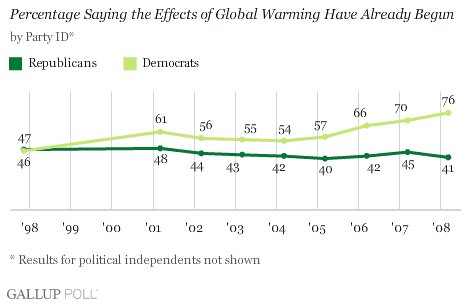
In 1997, Republicans and Democrats were equally likely to say the effects of global warming had "already begun to happen" (47% and 46%, respectively). In sharp contrast, this year's Gallup Environment Poll finds 41% of Republicans saying the effects of global warming have already begun, while over three-quarters of Democrats (76%) hold this view.
At the same time, during the past decade, Republicans have become much more likely to believe that news of global warming is "generally exaggerated" (from 34% in 1997 to 59% this year), while Democrats' agreement with that view have been fairly stable, at 23% in 1997 and 18% in 2008.
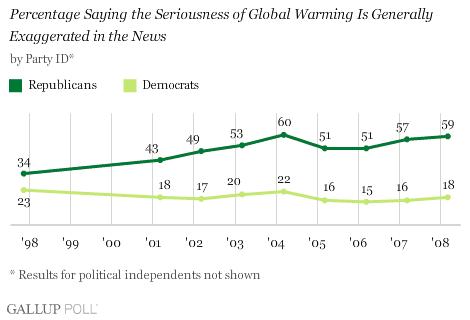
The scientific consensus over the reality and causes of global warming has grown stronger over the past decade, as reflected in the widely publicized reports of the Intergovernmental Panel on Climate Change (IPCC). Interestingly, both Republicans and Democrats have become more likely to believe that "most scientists believe that global warming is occurring," although Gallup's trend data are more limited on this question and thus, caution is called for in drawing firm conclusions.
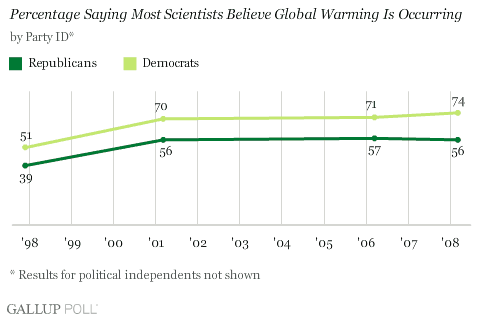
The percentage of Republicans holding this view increased from 39% in 1997 to 56% in 2001, and remains at that level in 2008. For Democrats the increase has been somewhat larger, from 51% in 1997 to 70% in 2001 and 74% today.
Although increasing proportions of both Republicans and Democrats agree that a majority of scientists believe global warming is occurring, the pattern is very different for the second key conclusion of the IPCC -- that human activities are contributing to global warming.
Gallup's trend data show that Republicans have become less likely to accept the idea of human contributions to global warming over the past half-decade -- the percentage believing that global warming is due more to "the effects of pollution from human activities" has declined by 10 percentage points, from 52% in 2003 to 42% in 2008. In contrast, Democrats may have become slightly more likely to attribute global warming to human activities, with the percentage giving this response increasing from 68% to 73% over the same period (although this shift is within the margin of error for the two Democratic samples).
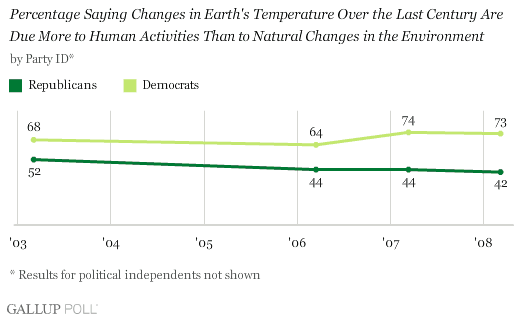
Finally, perhaps reflecting a synthesis of views on the foregoing issues, the trends reveal a modest increase in the gap between Republicans and Democrats over the threat posed by global warming.
There has been a modest increase in the percentage of Republicans who believe global warming "will pose a serious threat" to them during their lifetimes, from 21% in 1997 to 29% today. The increase among Democrats, from 36% to 50%, is only slightly larger. However, the result is that while fully half of Democrats see global warming as a serious threat, this is true of less than a third of Republicans.
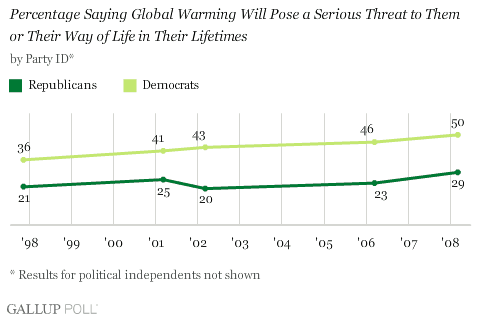
Explaining the growing partisan gap in public views of global warming will require extensive analyses. As shown, Republicans harbor more widespread skepticism of news coverage of global warming than they did a decade ago, and that could be driving down their willingness to believe environmental reports. Those doubts could be fueled, in turn, by the global warming skepticism currently expressed by party leaders and conservative pundits. It will be particularly interesting to see whether Republican presidential candidate John McCain's greener stance on the issue, including his support for policies to limit human-induced climate change, influences rank-and-file Republicans over the coming months.
Riley E. Dunlap is Regents Professor of Sociology at Oklahoma State University and Gallup Scholar for the Environment with the Gallup Organization.
The full essay by Dr. Dunlap on which this article is based, Climate-Change Views: Republican-Democratic Gap Expands, is available exclusively on gallup.com.
